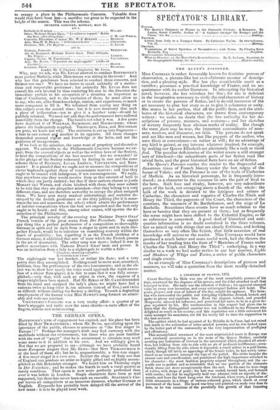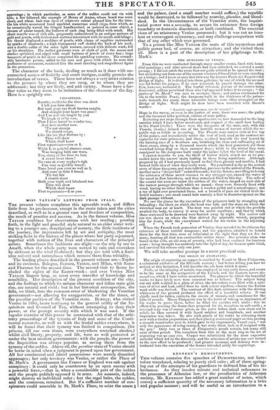SPECTATOR'S LIBRARY.
Frorrox,
The Queen's Poisoner; or France in the Sixteenth Century. A Romance. By Louisa Stuart Costello, Author of " A Summer amongst the Bocages and the Viues," &c. &c Bentley.
TRAVELS.
Letters from Italy to a Younger Sister. By Catherine Taylor. In two volumes. Vol. II Murray.
ORATORY,
Translations of Select Speeches of Demosthenes; with Notes. By Charles Rana
Kennedy. Esq. Deighton. MISCELLANEOUS INFORMATION, What to Observe; or the Traveller'sltemembraneer. By R. Jackson. Secretary to the Geographical Society, &c. &c Mad fen and Ca.
THE QUEEN'S POISONER.
Miss COSTELLO is rather favourably known for feminine powers of observation, a picture-like but over-elaborate manner of descrip- tion, and a pleasing style. She has also considerable merit as a versifier; possesses a practical knowledge of France, and an ac- quaintance with its earlier literature. In attempting the historical novel, however, she has mistaken her line ; for she is deficient in the imagination necessary to vivify the real characters of history or to create the persons of fiction, and is devoid moreover of the art necessary to plan her story so as to give it coherence or unity. She states in her preface, that all the public facts, and the attri- butes of the historical characters, are drawn from contemporary writers : we make no doubt that she has authority for her de- scriptions of persons, manners, and costumes ; and her sketches of scenery frequently bear obvious marks of reality. But though the mere facts may be true, the important concomitants of man- ners, motives, and discourse, are false. The persons do not speak and act like men and women, but like puppets of the author, who uses them at convenience—or rather at will ; for no advantage of any kind is gained, or any interest whatever inspired, for example, by makinn. our Queen Elizabeth act alternately like a rash or timid fool. The peculiar deficiencies of the writer create a still stranger sort of falsehood—the subordinate parts of her fiction read like trivial facts, and the great historical facts have an air of fiction.
The Queen's Poisoner carries the reader to the disgraceful and disastrous times of French history under the last reigns of the house of Valois; and the Poisoner is one of the tools of Catherine of Medicis. As an historical personage, he is frequently.intro- duced ; as a character in the romance he acts the part of rival to the hero. Both love and rivalry, however, are very subordinate parts of the book, not occupying above a fourth of the whole : the bulk of the work is devoted to the intrigues and crimes of Catherine, the characters and vagaries of Charles the Ninth and Henry the Third, the pageants of the Court, the characters of the courtiers, the massacre of St. Bartholomew, and the siege of La Rochelle. Sometimes these events have so much relation to the hero or heroine that they are present at them ; but as frequently the scene might have been shifted to the Celestial Empire, so far as coherence is concerned. A good deal of historical and anti- quarian information is no doubt contained in the three volumes, but so mixed up with things that are clearly fictitious, and looking themselves so very often like fiction, that little accession of real knowledge will accrue to the reader. Miss COSTELLO would have produced a much better and more useful work, had she thrown the results of her reading into the form of " Sketches of France under Charles the Ninth and Henry the Third"; embodying, in a way similar to a work we had under review in our last number, Lights and Shadows of Whigs and Tories, a series of public characters and single events. As an example of Miss COSTELLO'S descriptions of persons and manners, we will take a quotation from the most readily-detached matter.
A COURTIER OF FRANCE, 1572.
Count Boniface La Mole was one of the most remarkable persons of his time, renowned for the elegance of his person, and the éclat attached to all that belonged to him. His taste was the criterion of fashion ; his approval stamped value on every new invention, and every extravagant fashion and habit. The poets, players, and men of letters of the day, sought his applause. The beau- ties who surrounded the politic and intriguing Catherine, dressed, looked, and spoke to please and captivate him. Even the elegant, refined, and graceful Marguerite allowed his influence, and permitted her taste, to be in a great de- gree regulated by his. Her condescension in this respect had given rise to hints that the distinguished courtier was not indifferent to the Princess who delighted so much in his society; and this reputation not a little enhanced his value amongst his associates, nor did his vanity fail to turn the supposition to the best account.
The epithet which he had acquired of Le Baladin de la Cour, had not raised him much in the estimation of sober-minded persons, and he was looked upon by the better part of the community as the very impersonation of profligacy and effeminacy. This accomplished ornament of the most unprincipled court in Europe was now carelessly sauntering on in the train of the Queen Mother, carefully avoiding any indication of interest in the ceremonial which absorbed all atten- tion, but looking from side to side with an air of profound indifference ; occa- sionally lifting from his side, where it depended, a small mirror in a gold frame, which, though till lately an appendage of the female toilet, he had newly intro- duced as an ornament amongst the fops of the period. His attire bespoke the utmost care and consideration, and proclaimed the high importance attached to his character : the most faultless propriety reigned throughout, and the en- semble was so perfect and so inimitable that no one portion of the elaborate finish shone out more conspicuously than the rest. In his ears he wore rings of rubies with drops of pearl ; his hair was curled, turned back, and fastened with combs ; the hat he negligently held was adorned with an aigrette of dia- monds, and from the front hung over the forehead, when worn, a profusion of little ornaments in a fringe of various .coloured gems, which ;hook at every movement of the head. His beard was long and pointed—a mode very dear to him, as he was conscious of the peculiarly fine growth of that imposing appendage ; in which particular, as some of the nobles could not vie with him, a few followed the example of Henry of Anjou, whose beard was worn short, and whose hair was dyed of whatever colour pleased him for the time. On his white uncovered hand sparkled numerous small rings, from which, as he occasionally waved his fringed handkerchief, or pointed to some object, a stream of odour issued, the hollows of each ring being filled with musk. His short mantle was of rich silk, gorgeously embroidered in an antique pattern of gold and jewels, with devices and mottoes intermixed with its scrolls and foliage ; his throat displayed a necklace of pearls, with clasps of sapphire surrounded by sparks of diamonds ; a high transparent ruff shaded the back of his neck, and a double collar of the same light texture, covered with delicate work, fell on his shoulders. His nether garments were of cloth of gold, the seams and slashes sprinkled and edged with small buttons of jewels of every hue ; large bouquets of pearls in his shoes completed his sparkling costume. His remark- ably handsome person, added to the ease and grace with which he wore this profusion of ornament, rendered him the most dazzling and magnificent figure in the procession.
The character of the book, dealing so much as it does with un- connected scenes of festivity and court intrigue, readily permits the introduction of verses. These have not always a very strict relation to the persons by whom they are sung, or to whom they are addressed ; but they are lively, and add variety. Some have a fur- ther value as they seem to be imitations of the chansons of the day. Here is a sprightly one.
VILLANELLE.
Rosette, methinks the time was short I left you here alone; But soon your eye fresh fancies caught,
And straci,ht your heart was gone !
And I so well am taught by you To laugh at ev'ry vow, That I have learnt to wander too, And love another now.
'Tis not strange We should range, Like the bee that flutters by : Time will show Which shall know First repentance—you or I.- While I, in painful absence crest, Was weeping both our woes, You, chary of the time we lost,
A newer lover chose !
No vane at every zephyr's sigh Can veer so quickly round; None loved you once so well as And none so false I found.
'Tis but fair I should share Both your truth and falsehood too. Time will show Which shall know First repentance—I or you. •



























 Previous page
Previous page